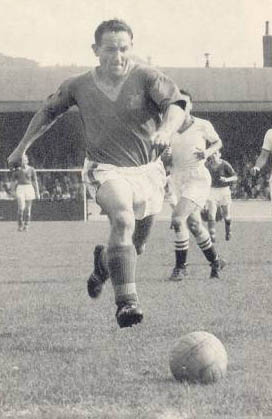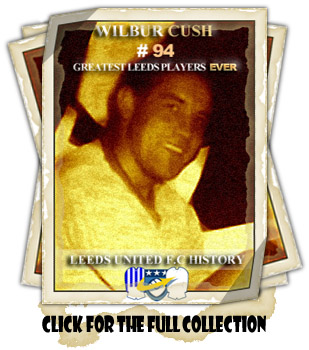

Cush: Wilbur
1957-1960
(Player Details)
Half Back/Inside Forward
Born: Lurgan, Northern Ireland: 10-06-1928
Debut v Manchester City (h): 16-11-1957
5’5” 11st 7lb (1957)
#94 in 100 Greatest LUFC Players Ever

Wilbur Cush was developed at Carrish School, Lurgan Boys’ Club and Shankhill YMCA before
signing for Glenavon in 1947. Cush spent over a decade as the "engine room" of the Glenavon side
that collected a variety of medals, including the Irish League Championship twice, in 1951-52 and
1956-57, the Irish Cup, in 1956-57, and runners-up in 1955-56, the Gold Cup twice in 1954-55 and
1956-57, the Ulster Cup, in 1954-55 and the City Cup twice, in 1954-55 and 1955-56, during the most
successful period in the club's history. In addition he played in Glenavon’s 1955 3-0 Irish Cup
Final defeat by Dundela, one of the biggest upsets in the competition’s history. A stalwart of
Northern Irish football for many years who moved to English football when he was nearing the
twilight of his career and belatedly enjoyed the limelight and more widespread recognition. His
fleeting international fame was not really the result of his efforts in English football, however.
Cush was a short but stocky man and, like many others of his build, he was unstintingly
competitive. Sir Stanley Matthews once said that being tackled by Cush was like being hit by a
tank. He was also usefully versatile. Predominantly a half back, akin to today’s holding midfield
player, Cush proved himself effective playing the more advanced inside forward role on several
occassions and also made a fist of the centre forward job when required. Cush spent the bulk of
his career in Northern Ireland with Glenavon and was a pivotal member of the team which took the
Irish championship out of Belfast for the first time in 1952. In 1957 Glenavon surpassed that
achievement by claiming a League and Cup double. He was selected as "Ulster Footballer of the Year"
in the 1956-57 season, his final year with Glenavon. Cush was by then a seasoned campaigner in
Irish football, idolised by the fans in Lurgan, but also recognised throughout Britain as a
formidable international opponent. This fact was highlighted in November 1957 when Leeds United
signed Cush from Glenavon for £7,000. It was a crushing blow to his hometown although few, if any,
begrudged Cush the opportunity of testing himself out in the Football League after his years of
stalwart service to the club. There was scarcely a more testing place to go at that time than
Leeds United. For several years the Elland Road club had been massively reliant on the incomparable
John Charles, their gentle giant. Charles, however, was no longer of that parish, having been sold
to Juventus in the summer and Leeds were already heavily involved in a desperate relegation battle.
Cush was a good man to have on board in such a situation. His defensive qualities were excellent,
he organised those around him well, worked tirelessly and could be ferocious in the tackle. His
passing was also crisp and simple and he never seemed to consider a cause lost. On top of that
Cush was never afraid to venture forward and was capable of chipping in with a goal, often when
one was most needed. He was so versatile and competitive that even at 5’5” he gave a good account
of himself at centre half on a couple of occasions. The Leeds manager, Raich Carter, was not slow
to recognise Cush's leadership qualities and appointed him the club captain. Although the season
was never less than a struggle Leeds survived in the First Division and the following year
improved slightly to finish fifteenth. Again the basis for survival was a competent defence. Cush
remained the consumate competitor and found willing and able support in the quickly developing
centre half Jackie Charlton. In the following season, 1959-60, the inherent deficiencies in the
side saw Leeds relegated and at the end of that season Cush returned to Northern Ireland. The
genial Irishman had already stepped down as captain to pave the way for the newly signed Don
Revie to take over and, at thirty-two, it was an obvious point to move on. His service at Elland
Road had been totally honest and committed but Leeds were in desperate need of a major overhaul.
As well as Charlton, Billy Bremner had also arrived on the scene and with Revie soon to take over
the managerial reins the club would begin its remarkable resurrection. In 1960 he moved to
Portadown and later moving back to his first club, Glenavon, as a player and later a coach. He won
an Irish Cup Runner-Up medal in 1961-62, with Portadown, as the Ports ran all-conquering Linfield
close on a number of fronts before losing out in the League Championship play-off decider, and
finishing as runners-up in the City Cup and losing the Ulster Cup Section A play-off replay. In
November 1966 Cush returned to Glenavon, playing first-team football beyond his fortieth birthday.
On retirement from playing he briefly coached at Glenavon before leaving football all together to
become a butcher. Dejected by his failure to win anything in England, Cush had fallen out of the
international reckoning until a word-in-the-ear from Peter Doherty gave him the belief to regain
his place for the 1961 end-of-season tour of Europe, and he won his final cap against Greece in
October 1961. However, it was the part Cush played in the fine Northern Ireland national side of
the 1950's that provides his greatest legacy. His twenty-six appearances comprised some of the
greatest moments in the history of Northern Irish football. Cush made his debut against England
in a 4-1 defeat in 1950 but was dropped after two games. By 1957, however, Cush was a regular
member of the side as Ireland sought to reach the World Cup finals for the first time. To qualify
Northern Ireland had to defeat Italy in their final group game in Belfast. One of footballs'
strangest stories unfolded. The referee appointed for the game ended up stuck in fog at London
airport and could not attend, a replacement official being summoned. The Italians refused to
recognise the substitute, however, and although they went ahead with the game they insisted on it
being classed a friendly only. This game finished 2-2 with Cush scoring both of Ireland's goals.
Had the Italians played the game as a qualifier they would have been through, as it was they now
had to return to Belfast two weeks later. This time Northern Ireland won, Cush scoring the winning
goal to send his nation to the finals in Sweden and cementing his place in Ulster folklore. The
first of these two games had been a brutal affair, the second, vastly more important meeting,
strangely subdued. Typically, Cush was equally influential in both types of game. Having fired
his country to the finals Cush got them off to a dream start, scoring the only goal of their
opening game against Czechoslovakia. Barely five foot five, standing on tip toes, Cush rose
splendidly to head home a Jimmy McIlroy centre. Cush was hugely important to an Irish effort that
surpassed all expectations. Alongside the silken qualities of Danny Blanchflower and McIlroy, the
stocky ball winner performed like a Trojan. His refusal to be denied was never more evident, or
important, than when Ireland drew level with Czechoslovakia in the play off game that became
neccessary at the end of the opening group. Bursting through the Czech defence Cush saw three
shots in succession blocked by the goalkeeper, the ball eventually falling into the path of Peter
McParland who crashed it home. Another McParland effort saw the Irish through to the quarter finals
where, depleted and exhausted, they were overwhelmed by France. When the Irish played their first
game after these momentous finals 58,000 people turned out to give them a hero’s welcome for a
game against England. The result was an enthralling 3-3 draw with Cush slamming home the opening
goal in emphatic fashion. Cush is also fondly remembered in Ireland for one particularly inspired
performance against Wales when he succeeded in completely subduing the awesome John Charles,
despite conceding the best part of a foot in height to the Welsh star. Charles himself ranked Cush
as one of his three most difficult opponents, comprising a somewhat unlikely trio alongside
Alfredo Di Stefano and Charlie Wayman. The force of Cush's tackling was perhaps the most noted of
his footballing attributes yet this observation was always accompanied by the recognition of his
staying within the laws of the game. There is no doubt that Cush was not the most gifted player
but he never gave less than his best and there are very few Northern Irishmen who have contributed
more to their country’s football heritage. After retiring from football he became a butcher. Cush
died at a desperately early age in 1981 after a short illness but he remains a hero to many in his
country a quarter of a century later. He played twenty-six times for Ireland scoring five goals.